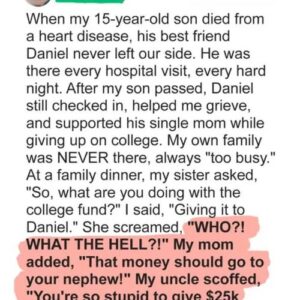I’ve been married to my husband, Tom, for six years. When we got together, he had 16-year-old twins, a boy and a girl, whose mother had been absent from their lives since they were 8. We worked hard to create a blended family, attending therapy sessions to ensure everyone felt heard and respected. I made it clear that I wasn’t trying to replace their mom, but over time, the twins started calling me “Mom” around the age of 12 or 13. It felt like we had become a real family.
However, our happy home faced a challenge recently when their biological mother reappeared. The twins were ecstatic to have her back in their lives, and I was genuinely happy for them. Yet, as the months passed, I noticed a change. They began calling me by my first name again, which stung, but I didn’t q
Things took a turn for the worse when their behavior became increasingly disrespectful. They ignored curfew rules, refused to clean up after themselves, and started talking back, often reminding me that I wasn’t their “real mom.” Three weeks ago, things came to a head during a heated argument. The twins called me names and then stormed out to live with their biological mother. To make matters worse, Tom didn’t back me up, leaving me feeling heartbroken and disrespected.
I realized I needed to teach not only the twins but also my husband a lesson about respect and appreciation. The day after the blow-up, I decided to make a bold move. I packed a bag and left a note on the kitchen counter, explaining that I needed some time away to reflect and recharge. In my note, I asked Tom to handle all household responsibilities and ensure the twins understood the importance of respect and cooperation in our family.
I rented a small cabin a few hours away and took time for myself, disconnecting from the chaos. Meanwhile, Tom struggled to manage the household alone. The twins, now living with their biological mother, quickly realized that their idealized version of life with her didn’t match reality. She was unreliable, often leaving them to fend for themselves. They missed the stability and care I had provided.
A few days later, I received a tearful call from the twins. They apologized profusely, expressing how much they missed me and regretted their behavior. They acknowledged that they had taken my presence for granted and now understood how much I had done for them. It was a heartfelt conversation that brought tears to my eyes.
When I returned home, we had a family meeting. The twins reiterated their apologies in person, and Tom admitted that he should have supported me more. We all discussed the importance of respect, communication, and understanding. I emphasized that while their biological mother would always hold a special place in their hearts, our family needed mutual respect to thrive.
From that day forward, things began to improve. The twins returned to calling me “Mom” and worked hard to rebuild the trust that had been damaged. Tom made a concerted effort to be more supportive, and we continued therapy sessions to ensure our family bond remained strong.
This experience taught us all a valuable lesson about the importance of respect and appreciation within a family. It was a difficult journey, but it ultimately brought us closer together, strengthening the love and understanding we had worked so hard to build.





